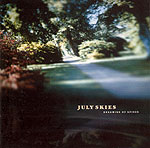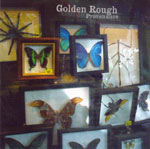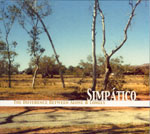Quiet Suburban Dreams | |

| There's something about the past, as an abstract notion, that is immensely appealing; the idea of the past being much more seductive than the reality of it. Of course the Kinks understood this implicitly when they recorded their songs of English mythic pasts in the likes of Village Green Preservation Society and Arthur, and it's something that resides today in the gorgeous simple beauty of July Skies' Dreaming of Spires album (Rocket Girl). July Skies is the solo efforts of Antony Harding (he's a member of Birmingham based electronica group Avrocar, if that means anything to you) and it's a sound in parts inspired by the delayed guitars of the likes of Slowdive's Neil Halstead, the English countryside and the innocence of the artwork in 1960s Ladybird books. Sound bizarre enough? Well, bizarre or not, Dreaming Of Spires recalls the sounds of Vini Reilly and early Blueboy which is something that ought to send a shiver down anyone's spine. It brings to mind the kind of atmospheres that lay in Ben Watt's North Marine Drive album, and in his glorious 'Summer Into Winter' EP collaboration with Robert Wyatt. This is the sound of lying on your back out by the old ruined castle or up by the deserted radar station on the hill, the one that used to search the skies for signs of incoming Russian missles, gazing at the wispiest of clouds in the endless big sky, dreaming of the subtlest of embraces. It's the sounds of sitting in the cool of the cathedral in the midst of summer, watching the dust motes dance multi-coloured pirouettes through the shafts of sunlight. It's laying in bed unable to sleep into the early hours of morning, mourning something lost that you can't quite name. An essence. A feeling you once knew you owned but that you know you don't feel any longer. It's the sound of memories tinkling from the top of your mind like the silver streams from the Canonteign falls. Dreaming Of Spires is a very English sound. It reverberates with the ghosts of places like the deserted airfields and coastal defence stations that Harding seems to be drawn to; the ghostly appeal in landscapes and architectures that contain no tangible personal memory, yet hold within them something altogether more illusory and tempting. With his July Skies project Harding is exploring an English rural environment that so many seem to ignore - he is putting sounds to sights and places that see few visitors, especially young ones. As such it feels terribly suburban, terribly middle-class and terribly Arcadian. Which, in case you were wondering, is a great compliment. Of course I must admit to having a soft spot for 'suburban' music. It's probably something to do with my personal history, growing up in that strangest of lands that lies someplace between what they used to call 'working class' and the wealthy upper (out of) reaches. I've always been drawn to music, and Art in general, that tells me something of the nature of such places, such lives. Such is the way of our existences I guess, such is the nature of our relationship with media and culture. It's a shame then that down the years there have been so few books, so few films, so few records that have really seemed able to speak to me about the specifics of my own life. So few people have seemed willing or able to express and evoke the nature of the real middle-classes. It's like some embarrassing hinterland where there is assumed to be nothing of worth; there is an assumption that it's all safe ground not worth investigating. |

| Maybe this is why I love Australian band Golden Rough's Provenance album (Candle Records). I mean, how can I resist a song (the title track) where a voice sings lines like 'I come from a quiet suburban place / and I have no ghosts or fears of any kind to face / and I have no blues to sing / except of my own making'? I can't. Because this song tells it like it is, was, will doubtless ever be: the middle-class guilt of having had no family trauma to fire some kind of 'creative' drive; the sense of both believing the myth of the blues and of knowing it's all full of a kind of crap that means nothing to you personally. The desire to both detach from and engage with a cultural hegemony that you both despise and adore. So I admit to loving these kinds of songs that deal with issues like how it feels to have not really very many issues at all; songs that deal with the very essence of the knowingness of Pop, of the mediated mythology of the whole game. It's there in the lovely 'Summer Feeling' with those lines 'we're living the lie that nothing changes / living the lie that life goes on / waiting for the summer feeling / that's a long time gone' and it's there in the exquisite '99%' where vocalist David Orwell plaintively sings: '99% of everything is killing me / but there's one so fine / it's the one that keeps me trying'. This is so clearly middle-class angst that it would be hilarious if it weren't so touching; would be laughable (IS laughable) if it weren't so goddamn truthful. It's an open, self-inflicted sore that doesn't even really exist. Which is the hardest kind of all to treat. I think this is why I am drawn to many current Australian bands: there seems to be a willingness to write songs that set themselves largely un-apologetically within that middle-class suburban land where there's nothing else to do but think about girls and boys and summer days and bicycles in the yard; the hardships and inequalities of a world that doesn't quite touch up against yours; the guilt that such distance causes. This is why I like the Lucksmiths, and the Golden Rough. It's why I like Darren Hanlon, whose Hello Stranger album is a lovely trip through scrabble games, cures for hiccups, bicycle kick-stands, lost lovers and Punkette chums. It's a charmer of an album; a record that has no pretensions of doing anything other than telling some quirky and quaint tales of lives lived and loves lost and found under skies of blue and grey, you take your pick. I mean, how can I resist a record that has a line that goes 'there's a hint of that perfume on blankets in the lounge room'? A line that reminds me of when I would lay on the sofa breathing in the scent left from a cursory visit, or how I once spent days walking around clutching a book about the Bauhaus close to my nostrils because it was returned by a certain person and that certain person's perfume pervaded its pages. A line that drives me to replay an answerphone message saved from years ago. |

| Then there's Simpatico. Essentially the project of ex-Sweet William auteur Jason Sweeney, Simpatico makes the sounds that you'd get if you imagined the Field Mice making if their world were filled with more of a heat haze than a steady light drizzle. Or Brighter if they had only had a little more guts to them (but only a little). The Difference Between Alone and Lonely (Matinee / Gifted)is a fine collection of almost empty songs; there's lots of space between drum machines and guitars here, lots of room for the echoing vocals to weave their melancholic strains. And if it all sounds a bit forced at times, well, that's just part of the deal, is part of what I mean by the suburban middle-classes' self-inflicted angst. Filled to the brim with the love of melancholy, topped up with a celebration of isolation and peppered with the tears of a clown, Simpatico is the sound of someone flailing in their own emptiness, desperate to both leave it behind and to stay locked inside it forever. © Alistair Fitchett 2002 July Skies' Dreaming of Spires is available through Rocket Girl records. The Golden Rough and Darren Hanlon albums are available through Candle Records. They currently have no UK distribution (someone sort this out!). A Candle Records compilation Feast is also available and is highly recommended. |